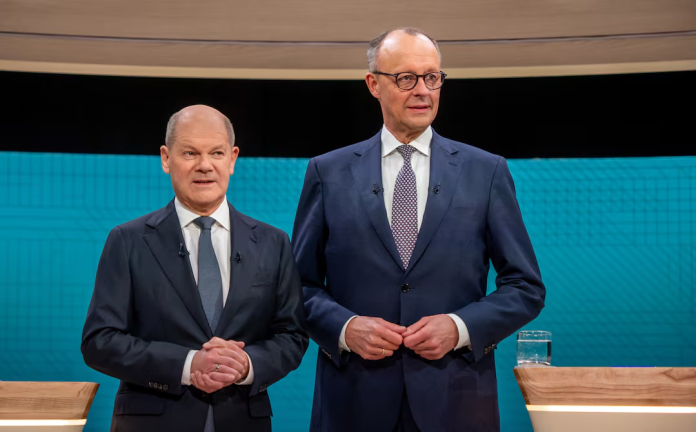German Chancellor Olaf Scholz and opposition leader Friedrich Merz exchanged sharp criticisms during the final parliamentary session before the 23 February election, according to AP News.
With polls showing Merz’s Union bloc in the lead and Scholz’s Social Democrats trailing, the debate underscored the high stakes of the upcoming vote, highlighting stark differences over the economy and migration.
Scholz defended his government’s handling of Germany’s economic struggles, citing external pressures such as the war in Ukraine, the energy crisis, and inflation. He also pointed to the disruptive impact of US President Donald Trump’s foreign policy and recent steel and aluminium tariffs.
The wind is blowing in our face at the moment. And the truth is that that won’t change fundamentally in the coming years.
He emphasised the need for “strong leadership, strong nerves, and a clear course” rather than “fickleness and a loud mouth,” accusing Merz of inconsistent positions on Ukraine and refugee policies.
Merz, however, dismissed Scholz’s leadership, comparing him and Vice Chancellor Robert Habeck to “two managers who have driven the company into the wall” and now seek to continue their failed strategies. He also criticised the government for leaving behind an economic “disaster,” citing Germany’s shrinking economy and labour market challenges.
What we hear from you is … ‘I did everything right, it’s just that everyone else hasn’t understood this chancellor’s wisdom and intelligence.’
Migration and political taboos
The debate also highlighted contrasting approaches to migration. Scholz accused Merz of “irresponsible gambling” for proposing stricter border controls and relying on support from the Alternative for Germany (AfD) party to pass a nonbinding motion in parliament.
Merz reiterated his commitment to avoiding collaboration with the AfD but warned that failure to address Germany’s challenges could lead to populists gaining significant influence.
The next government must succeed in facing Germany’s challenges, otherwise right-wing populists could one day come close to a majority.
With the AfD polling in second place, the election has become a battleground over Germany’s future direction. Scholz’s coalition, which collapsed in November over economic policy disputes, faces an uphill battle to regain voter confidence. Meanwhile, Merz’s Union bloc is positioning itself as the alternative to both the current government and the national-oriented forces.
